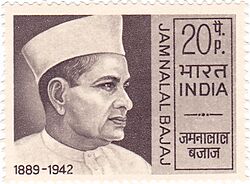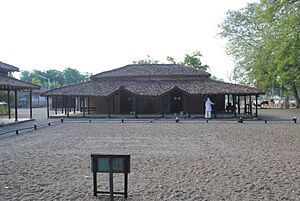Jamnalal Bajaj facts for kids
Quick facts for kids
Jamnalal Bajaj
|
|
|---|---|

Bajaj on a 1970 Stamp of India
|
|
| Born |
Jamnalal Kaniram Bajaj
4 November 1889 |
| Died | 11 February 1942 (aged 52) Wardha, Central Provinces and Berar, British India
|
| Occupation |
|
| Spouse(s) |
Janaki Devi Bajaj
(m. 1902) |
| Children | 5 |
Jamnalal Bajaj (born November 4, 1889 – died February 11, 1942) was an important Indian businessman. He started the Bajaj Group of companies in the 1920s. Today, this group has many companies, some of which are listed on stock markets. Jamnalal Bajaj was also a very close friend of Mahatma Gandhi. Gandhi even called him his "fifth son."
Contents
Early Life and Family
Jamnalal Bajaj was born in 1889 in a small village called Kashi Ka Bas. His family, Kaniram and Birdibai, were not rich. When he was five years old, a wealthy businessman named Seth Bachharaj Bajaj saw him. Seth Bachharaj was visiting a temple in Jamnalal's village. He liked young Jamnalal very much. After talking to his parents, Seth Bachharaj adopted Jamnalal as his grandson. To thank the village, Seth Bajaj built a well there.
Seth Bachharaj was a distant relative of Jamnalal's father. He was a well-known and respected trader during the time of British rule in India.
When Jamnalal was twelve, he married JankiDevi. She was about nine years old at the time.
As Jamnalal grew up, Seth Bachharaj taught him about business. Jamnalal learned how to trade goods, keep careful records, and buy and sell things. He became very good at business. After Seth Bachharaj passed away, Jamnalal continued to grow the family's business. In 1926, he started what is now known as the Bajaj group of industries.
Working with the British Government
During the First World War, the British government wanted money to help with the war. They tried to get support from Indian traders. They made Jamnalal an honorary magistrate, which meant he could help with local legal matters. When he gave money for the war, the British gave him the title of Rai Bahadur. This was a special honor. However, Jamnalal later gave up this title in 1921. He did this to support the non-cooperation movement, which was a peaceful protest against British rule.
A Follower of Mahatma Gandhi
When Mahatma Gandhi returned to India from South Africa, Jamnalal became very interested in Gandhi's ideas. He believed in Gandhi's principles, like Ahimsa (non-violence). He also admired Gandhi's dedication to helping poor people. Jamnalal understood Gandhi's idea that making goods at home could help India's poverty. He saw that British companies were taking cheap cotton from India and selling expensive finished cloth back to Indians.
Jamnalal was inspired by Gandhi's simple life at the Sabarmati Ashram. He was impressed by the daily routine of prayer and physical work there. He even brought his wife, Jankidevi, and his children to live in the Ashram. Jamnalal's close connection to Gandhi and his deep involvement in the fight for India's freedom meant he had less time for his new business.
Joining the Freedom Struggle
In 1920, Jamnalal was chosen to lead the welcome committee for the Indian National Congress meeting in Nagpur. He gave up his "Rai Bahadur" title from the British government. In 1921, he joined the non-cooperation movement, a peaceful protest against British rule.
Later, in 1923, he took part in the flag satyagraha (a non-violent protest). This was in Nagpur, where there was a ban on flying the Indian national flag. Jamnalal bravely defied this ban and was arrested by British forces. This act made him admired across India.
Jamnalal wanted Gandhi to move to Wardha and make it the main place for his activities. After the famous Dandi March in April 1930, Gandhi moved to Sevagram. This was a small village near Wardha. Gandhi wanted to live close to the people in rural areas. He promised not to return to Sabarmati Ashram until India became free.
Jamnalal was made the president of Gandhi Seva Sangha. This was a group of people who worked on helpful projects. In 1933, he was also chosen as a member of the Congress Working Committee and became the treasurer of the Congress party.
Social Work and Initiatives
Jamnalal Bajaj cared deeply about social issues. He worked to remove untouchability, which was a harmful practice where some people were treated as outsiders. He also promoted the Hindi language and encouraged the use of Khadi, which is hand-spun and hand-woven cloth, and other village industries. He traveled all over India to promote Khadi.
In 1925, he became the treasurer of the All India Spinners Association. He was also the president of the All India Hindi Sahitya Sammelan, a meeting that promoted Hindi as a language to unite all Indians. He helped publish Hindi magazines and books. He started the Gandhi Hindi Pustak Bhandar (bookshop) in Bombay and the Sasta Sahitya Mandal (publishing house).
He also founded the Dakshin Bharat Hindi Prachar Sabha with C. Rajagopalachari. Their goal was to spread the learning of Hindi across southern India.
From 1927, Jamnalal was the first Treasurer of the Managing Committee of Jamia Millia Islamia, a university in New Delhi. In 1928, he became a lifetime member of the university while still serving as its treasurer.
To fight untouchability, he challenged the rule that prevented Harijans (a name Gandhi gave to people considered "untouchable") from entering Hindu temples in his hometown of Wardha. When traditional Hindu priests objected, he opened his own family temple, the Laxmi Narayan Mandir, to Harijans in 1928. He also started a campaign by eating a meal with Harijans and opening public wells to them. He opened several wells on his own land for everyone to use.
Because of his dedication, he was elected the chief of the Jaipur Rajya Praja Mandal in 1938. This was a group working for people's rights in the Jaipur state. As chief, he helped make peace between the Maharajas of Sikar and Jaipur.
To honor his social work, the Jamnalal Bajaj Award was created by the Bajaj Foundation. Famous people like Nelson Mandela and Desmund Tutu have received this award.
Business Success
Besides Bajaj Auto Ltd, which makes vehicles, the Bajaj Group includes other big companies. These are Mukand Ltd, Bajaj Electricals Ltd, and Bajaj Hindusthan Ltd. One of his grandsons, Rahul Bajaj, later led the main company, Bajaj Auto.
Remembering Jamnalal Bajaj
Many places and institutions in India are named after Jamnalal Bajaj. These include the Jamnalal Bajaj Institute of Management Studies. A neighborhood in Mumbai called JB Nagar is also named after him. The Jamnalal Bajaj Award was started in 1978 by the Jamnalal Bajaj Foundation. These awards are given out every year on his birthday to honor people who do important social work.
|
 | Janet Taylor Pickett |
 | Synthia Saint James |
 | Howardena Pindell |
 | Faith Ringgold |


